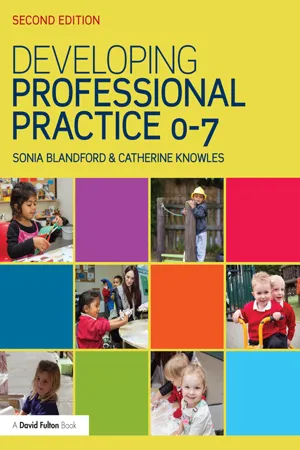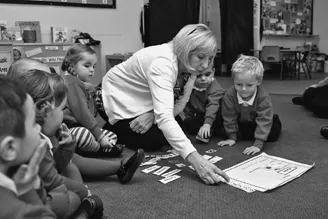![]()
Part I
Leading learning
By the time you have completed this chapter you should be able to answer the following questions:
• What are the relevant government documents relating to early years education and childcare since 2005?
• What factors have influenced government policy?
• What does quality mean in the context of early education?
• What do I need to consider in the creation of a learning context?
• Why should I study current research on early years learning contexts?
STANDARDS
This chapter will support your understanding of the following Teachers’ Standards (Early Years) (see Appendix 1 for Standards):
✓ Set high expectations which inspire, motivate and challenge all children. 1.1, 1.3
✓ Promote good progress and outcomes by children. 2.2., 2.5
✓ Demonstrate good knowledge of early learning and EYFS. 3.1, 3.2
✓ Plan education and care taking account of the needs of all children. 4.3, 4.5
✓ Adapt education and care to respond to the strengths and needs of all children. 5.1, 5.2, 5.3
✓ Make accurate and productive use of assessment. 6.2
✓ Safeguard and promote the welfare of children, and provide a safe learning environment. 7.1, 7.2
✓ Fulfil wider professional responsibilities. 8.1, 8.2, 8.6
Introduction
Learning begins from birth, and high quality early education and care has the potential to make an important and positive impact on the learning, development and wellbeing of babies and young children, in their daily lives and the longer term. This country has long understood the importance of early education, with nursery schools having been established for almost a century. We have come a long way since those early days, and I believe that every child in home and group settings today deserves the very best early education and care.
(Source: Nutbrown, 2012: 2)
Good quality early education has a positive impact on children’s learning, development and well-being, leading to improved academic, social and emotional trajectories. This is expressed in the above quote from the Nutbrown (2012) review of qualifications for those engaged in early education and childcare, which set ‘quality’ firmly within the context of well-qualified early years teachers and practitioners. In recent years there have been many advances in the domain of early childhood, particularly across the developed world. Researchers and policy makers alike acknowledge the significance of the early years of life for setting the foundations for the people we become. Recent government policy in England, driven by a desire for more equitable educational provision, is embodied by the belief that every child deserves the best possible start in life. This is supported by the Statutory framework for the early years foundation stage: Setting the standards for learning, development and care for children from birth to five (EYFS) (DfE, 2014) and the Teachers’ Standards (Early Years) (NCTL, 2013).
As a student embarking on the study of early years you are part of an exciting and challenging period in the history of childhood education and practice. The last decade has seen a domestic political shift in thinking on child development, informed by advances in neuroscience and furthered by the Field Review (2010), the Allen Report (2011), the Tickell Review (2011) and the Nutbrown Review (2012). These documents highlight the increasing emphasis placed on learning contexts in terms of quality and closing the attainment gap through equitable provision for all children. This has been at the forefront of research and government policy in many OECD (Organisation for Economic Co-operation and Development) countries. In 2001, the OECD published the first of its series Starting Strong: Early Childhood Care and Education (ECEC), a comparison of early childhood policies and related information on education and child development, across 20 countries; Starting Strong III: A Quality Toolbox for Early Childhood Education and Care (OECD) was published in 2012. (The OECD was founded in Paris in 1961 to provide a forum for democratic governments to promote and support economic and social development).
We live in an increasingly global world, made possible through significant advances in Information and Communication Technology (ICT).This has led to an increased interest in comparisons of national educational systems, with the aim of adapting policies or practices that may lead to improved outcomes for children. At the same time the body of international research studies documenting early years educational practice and policy has increased significantly over the last few years. It provides a valuable insight into how we can approach early years practice in the UK. Throughout this book you will be engaged to varying degrees with a range of national and international documents. UK government policy documents are often cited and you will consider how these are a necessary point of reference for both shaping and informing effective practice.
To begin, this book covers Early Years Foundation Stage (0–5) and Key Stage 1 (5–7 years). In practice, there is an overlap both in provision and in children’s development at each stage, an important point to remember throughout the book. However, it is for you as teachers and practitioners to adapt your thinking as you read each policy and practice. Always be aware of the differences and overlaps; never assume that each sub-stage is the same as the next. Children are individuals who grow and develop at their own pace, guided by parents, carers and professionals. Consider your role in this relationship as you read through each chapter. Increased provision requires increased capacity in early years teachers and practitioners, with a focus on quality education and childcare to compete with other European countries. The need and consequent provision of childcare has led to a raft of government reforms. By examining government policy on early years education and childcare, this chapter will first consider the extent to which early years provision and the emerging learning context for the Early Years Foundation Stage (0–5) and Key Stage 1 children has been shaped by national policy; and second consider how a constant striving for quality leads to the best outcomes for all children irrespective of their background, challenges or need.
Creating policy: The national context
This section will provide a brief outline of the government policies which have influenced early years practice contemporarily. In examining chronologically, the government documents that have directly influenced the delivery of services within the early years, this section will provide some insight into national policy and in so doing will help you to consider which documents will be most helpful for informing practice within a setting.
Given the centrality of government policy in providing the framework for the provision and delivery of early years services, it is important to be able to understand and interpret what each document means for practice. As a practitioner you will have to decide, along with other team members, how you will implement a particular policy document. Some relate more directly to practice than others and you will refer to these on a regular basis, e.g. The Statutory framework for the early years foundation stage: Setting the standards for learning, development and care for children from birth to five (EYFS) (DfE, 2014) and the Key Stage 1 Curriculum. To guide you through the documents examined in this section and as a reference point for your own use, the following table provides a chronological summary, outlining the principal aim of each document: The present climate for change within early years in England, began with the government’s National Childcare Strategy, set out in their Green Paper, Meeting the Childcare Challenge (1998). By promoting the implementation and development of affordable, high-quality education and care f...







